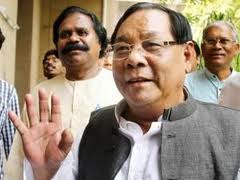
New Delhi, June 22: Pinning hopes on "conscience vote" and his tribal identity, P A Sangma today virtually dared UPA nominee Pranab Mukherjee for a debate ahead of presidential polls, saying democracy needs debate.
Maintaining that in a democracy people have the right to choose and there should be a debate at a time when the economy is sinking and scams are unimaginable, Sangma said, "Who is responsible for all this corruption...It has to be a candidate to candidate debate".
Asked whether he was throwing a challenge to Mukherjee, Sangma, who has the backing of BJP, BJD and AIADMK, said it was a practice. "Democracy means debate. I am asking for debate," he told TV channels.
Claiming that he will win the presidential race, Sangma also said he has sought appointments with Trinamool Congress chief Mamata Banerjee and Shiv Sena supremo Bal Thackeray. He said that he was going to reach out to every one.
"The election will be by a secret ballot. Secret ballot means conscience vote. I depend on conscience vote and I believe in conscience vote," he said.
He said that the fact that there is a "split" in almost all political parties shows that this Presidential election is a serious one and "not as smooth as the Congress is claiming".
Sangma said that the UPA candidate is also not getting the undivided support of the ruling alliance as Mamata, whose party in a constituent of UPA, is "not supporting Mukherjee as yet".
He said that he is "constantly in touch" with the Trinamool Congress chief and is "very hopeful of her support". He said, "I am going to meet her in next few days."
Playing the tribal card, Sangma said that he wanted to correct the historic mistakes the country has committed as "tribals have not been given their due...I appeal to the consience of the nation. We have given our land, our forest, our natural resources...please recognize us."





Comments
Add new comment